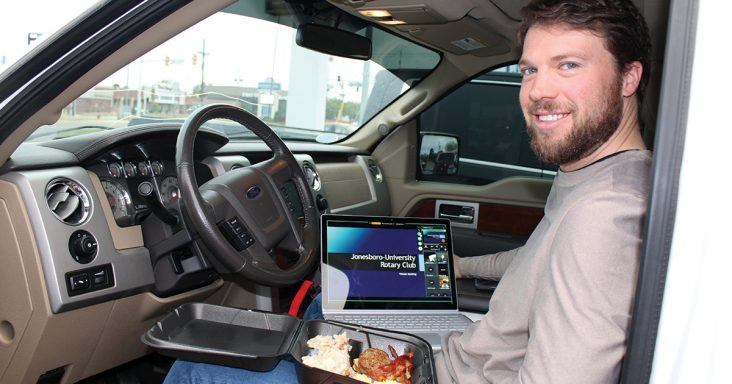Business As Unusual: NEA organizations adjusting to COVID-19 limitations
by May 15, 2020 10:43 am 772 views

Though the novel coronavirus brought the American economy to a virtual standstill and forced major disruptions to Americans’ lifestyles, residents of Northeast Arkansas are finding ways to meet the challenges of what has become — at least for now — the new normal.
Gov. Asa Hutchinson said on May 4 that churches may resume meeting in-person, following social distancing guidance and implementation of other measures. Those include having no physical contact, no communion, no classes for youth and no childcare. The governor encouraged churches to continue to provide online services for the foreseeable future as an alternative for anyone who does not wish to worship in person.
Also on May 4, Hutchinson said large outdoor venues may reopen subject to social distancing and sanitation restrictions. He is expected to issue large indoor venue guidelines on May 18 as well as guidance for bars.
The governor said he expects some “localized spikes” in COVID-19 infections as the state begins to reopen this month, but state officials will be expected to contain any outbreaks so the state can move to the next, wider phase of reopening.
As of mid-May, there were approximately 4,300 cumulative confirmed COVID-19 cases in Arkansas with nearly 100 deaths.
Employing social distancing, limiting the size of gatherings and encouraging those who could do so to work from home brought many of the strategies that area residents have devised for working around the restrictions.
The Jonesboro-University Rotary Club normally meets at 7 a.m. Thursdays at popular restaurant Sue’s Kitchen Express. When the restrictions limited restaurants to takeout or delivery only, the rotary club undertook a hybrid workaround — virtual meetings that still include breakfast and allow for social networking and social distancing.
Attendees drive up and park — distancing themselves socially — or attend from their homes or offices. The meeting takes place via the app GoToMeeting so participants can see and hear each other and the program presenter.
Club President Adam Sartin said though the switch to the virtual meetings required quite an adjustment, it has allowed those whose schedules or responsibilities may have changed the opportunity to participate without attending a physical meeting. Several other civic clubs, among them the University Heights Lions and the Exchange Club, are using the meeting app Zoom for their virtual gatherings.
Jonesboro Mayor Harold Perrin said the city is using Zoom, Facebook Live and a public access cable TV channel to conduct its meetings and make sure citizens see and may participate in meetings of the city council and committees as well as other boards and commissions.
“We don’t want the public to think they can’t have input into decisions,” Perrin said.
“We had a learning curve” to flatten before the city mastered the technology, he said. It takes more time to do a council meeting now than when the meetings were conducted at city hall, he added.
City Hall employees who can do so were asked to work remotely, Perrin said. But as a manager, he has found that work can be accomplished more quickly at the office because an employee may not have access to a needed file or record that is located at the office and not accessible on the employee’s laptop computer.
“I tried it for a couple of days … and just couldn’t do it because of the limitations” in getting some things done and communicating with all the necessary parties, Perrin said.
John Mixon, a principal in Cooper Mixon Architects, said the company decided early on in the pandemic response to switch to working from home. Since the firm has four employees working from four homes, he said, “It was easy to do. We decided to do all our work remotely, meet over the computer throughout the day, sending each other messages. We use Microsoft Teams to be able to share files and the like. That’s how we simulate the office environment.”
Mixon said the firm recently attended a school board meeting done over the Google Meeting platform.
“It was an interview, and we were not the only one on the team. The contractor on the team was in one office, we were in another office and the board members were all in their homes,” he said.
“I’ve always had the GoToMeeting software just for a phone call to share with consultants, share files immediately. It’s really expanded my use of the phone,” Mixon said. “It will become a part of what we do all day.”
Craighead County District Court Judge Tommy Fowler said he and David Boling, the county’s other district court judge, made the decision to shut down in-person operations a week before the Arkansas Supreme Court issued its per curiam order instructing courts to shut down. Court clerks were grouped into two teams and are alternating working at home and at the office, Fowler said. The in-office clerks are handling customers at the walk-up and drive-thru windows for traffic tickets at the Justice Complex.
Since he and Boling were named state district court judges under Amendment 80, they also can handle uncontested divorces and probate matters as well as civil and small claims court by a system of signing and scanning documents and returning documents to the county and circuit clerks. Fowler has proposed a system for continuing social distancing and building occupancy rules when the court returns to in-person sessions, he said.
In the future, Mixon said, “We will be much more open to hiring remote employees in my mind — thinking outside of our region, which has never been a possibility before. This has built my confidence that you can work together and supervise using technology. I’m going to go out on a limb and try it. If the right person exists, it’s not really going to matter too much where they are.”
